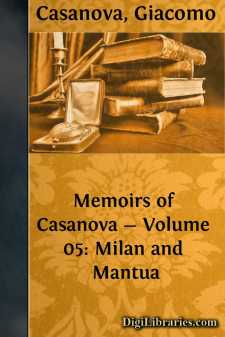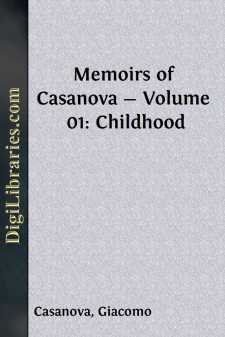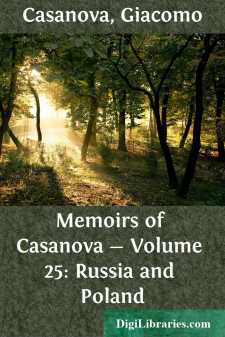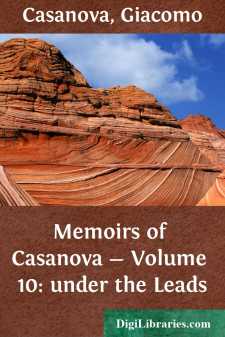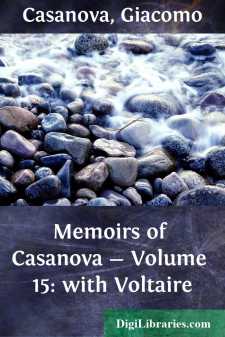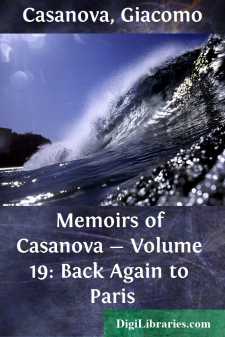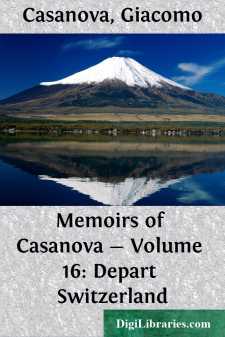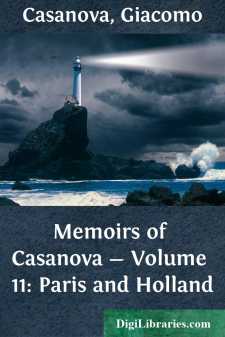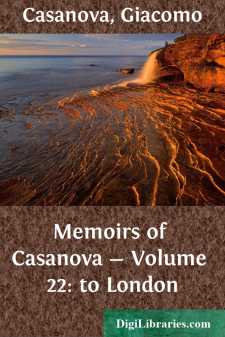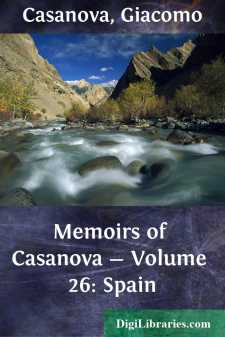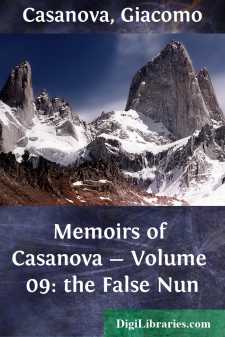Categories
- Antiques & Collectibles 13
- Architecture 36
- Art 48
- Bibles 22
- Biography & Autobiography 813
- Body, Mind & Spirit 142
- Business & Economics 28
- Children's Books 17
- Children's Fiction 14
- Computers 4
- Cooking 94
- Crafts & Hobbies 4
- Drama 346
- Education 46
- Family & Relationships 57
- Fiction 11829
- Games 19
- Gardening 17
- Health & Fitness 34
- History 1377
- House & Home 1
- Humor 147
- Juvenile Fiction 1873
- Juvenile Nonfiction 202
- Language Arts & Disciplines 88
- Law 16
- Literary Collections 686
- Literary Criticism 179
- Mathematics 13
- Medical 41
- Music 40
- Nature 179
- Non-Classifiable 1768
- Performing Arts 7
- Periodicals 1453
- Philosophy 64
- Photography 2
- Poetry 896
- Political Science 203
- Psychology 42
- Reference 154
- Religion 513
- Science 126
- Self-Help 84
- Social Science 81
- Sports & Recreation 34
- Study Aids 3
- Technology & Engineering 59
- Transportation 23
- Travel 463
- True Crime 29
Memoirs of Casanova - Volume 05: Milan and Mantua
by: Giacomo Casanova
Categories:
Description:
Excerpt
Slight Misfortunes Compel Me to Leave Venice—My Adventures in Milan and
Mantua
On Low Sunday Charles paid us a visit with his lovely wife, who seemed totally indifferent to what Christine used to be. Her hair dressed with powder did not please me as well as the raven black of her beautiful locks, and her fashionable town attire did not, in my eyes, suit her as well as her rich country dress. But the countenances of husband and wife bore the stamp of happiness. Charles reproached me in a friendly manner because I had not called once upon them, and, in order to atone for my apparent negligence, I went to see them the next day with M. Dandolo. Charles told me that his wife was idolized by his aunt and his sister who had become her bosom friend; that she was kind, affectionate, unassuming, and of a disposition which enforced affection. I was no less pleased with this favourable state of things than with the facility with which Christine was learning the Venetian dialect.
When M. Dandolo and I called at their house, Charles was not at home; Christine was alone with his two relatives. The most friendly welcome was proffered to us, and in the course of conversation the aunt praised the progress made by Christine in her writing very highly, and asked her to let me see her copy-book. I followed her to the next room, where she told me that she was very happy; that every day she discovered new virtues in her husband. He had told her, without the slightest appearance of suspicion of displeasure, that he knew that we had spent two days together in Treviso, and that he had laughed at the well-meaning fool who had given him that piece of information in the hope of raising a cloud in the heaven of their felicity.
Charles was truly endowed with all the virtues, with all the noble qualities of an honest and distinguished man. Twenty-six years afterwards I happened to require the assistance of his purse, and found him my true friend. I never was a frequent visitor at his house, and he appreciated my delicacy. He died a few months before my last departure from Venice, leaving his widow in easy circumstances, and three well-educated sons, all with good positions, who may, for what I know, be still living with their mother.
In June I went to the fair at Padua, and made the acquaintance of a young man of my own age, who was then studying mathematics under the celebrated Professor Succi. His name was Tognolo, but thinking it did not sound well, he changed it for that of Fabris. He became, in after years, Comte de Fabris, lieutenant-general under Joseph II., and died Governor of Transylvania. This man, who owed his high fortune to his talents, would, perhaps, have lived and died unknown if he had kept his name of Tognolo, a truly vulgar one. He was from Uderzo, a large village of the Venetian Friuli. He had a brother in the Church, a man of parts, and a great gamester, who, having a deep knowledge of the world, had taken the name of Fabris, and the younger brother had to assume it likewise. Soon afterwards he bought an estate with the title of count, became a Venetian nobleman, and his origin as a country bumpkin was forgotten....


